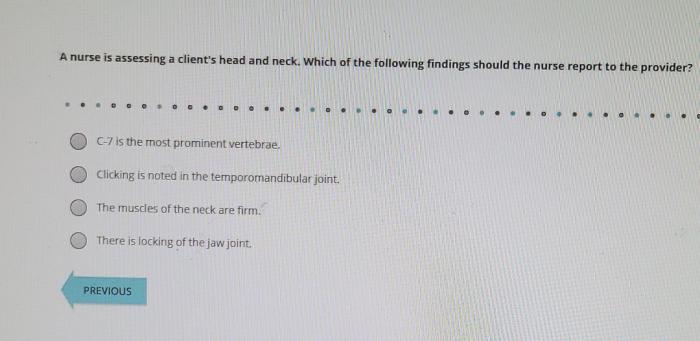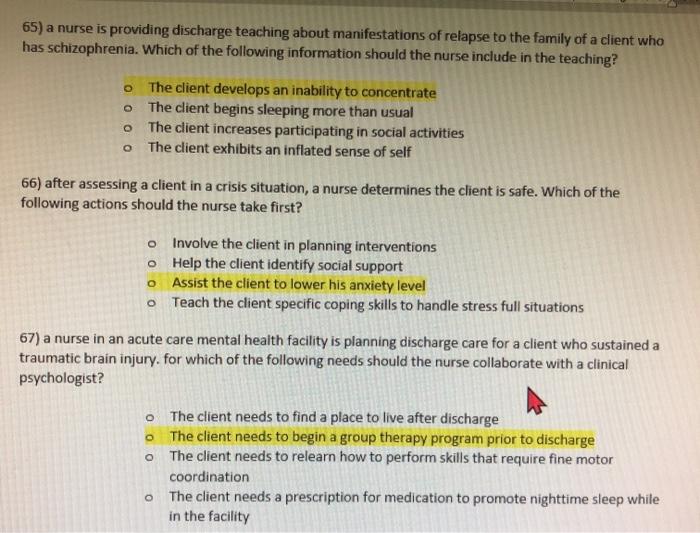A nurse is assessing a client who has multiple sclerosis, a chronic neurological condition that affects the brain and spinal cord. This assessment plays a crucial role in understanding the client’s unique presentation of symptoms, disease progression, and overall well-being.
Multiple sclerosis is a complex condition with varying manifestations, making each client’s experience unique. The nurse’s assessment serves as a foundation for developing individualized care plans that address the client’s specific needs and goals.
Introduction

Multiple sclerosis (MS) is a chronic autoimmune disease that affects the central nervous system (CNS), including the brain, spinal cord, and optic nerves. It is a complex and unpredictable condition that can vary widely in its presentation and progression.
Nurses play a crucial role in assessing clients with MS, providing comprehensive care, and supporting them in managing the challenges of living with this condition.
Assessment Techniques
Nurses use a variety of assessment techniques to evaluate clients with MS, including:
- Physical examination:This involves a thorough physical examination to assess general health, neurological function, and any physical limitations.
- Neurological examination:This focuses on evaluating neurological function, including muscle strength, coordination, reflexes, and sensory perception.
- Cognitive assessment:This assesses cognitive abilities, such as memory, attention, and problem-solving skills.
- Functional assessment:This evaluates the client’s ability to perform activities of daily living (ADLs), such as bathing, dressing, and cooking.
Common Symptoms and Signs
The symptoms and signs of MS can vary depending on the location and severity of the lesions in the CNS. Common symptoms include:
- Fatigue
- Weakness
- Numbness or tingling
- Difficulty with balance and coordination
- Cognitive problems, such as memory loss and difficulty concentrating
- Emotional changes, such as depression and anxiety
Impact on Daily Life
MS can significantly impact a client’s daily life, affecting their ability to perform ADLs, work, participate in social activities, and maintain relationships.
The impact of MS on daily life can vary depending on the severity of the condition and the individual’s coping mechanisms.
Nursing Interventions
Nurses play a key role in managing MS and supporting clients in living well with the condition. Nursing interventions include:
- Medication management:Administering and monitoring medications prescribed for MS, such as disease-modifying therapies (DMTs) and symptomatic treatments.
- Symptom management:Providing interventions to manage symptoms, such as fatigue, pain, and cognitive difficulties.
- Education and support:Educating clients about MS, its management, and available resources. Providing emotional support and guidance to clients and their families.
- Advocacy:Advocating for clients’ rights and ensuring they have access to appropriate care and resources.
Collaboration with Other Healthcare Professionals
Managing MS requires a collaborative approach involving nurses, physicians, physical therapists, occupational therapists, speech therapists, and other healthcare professionals.
This collaboration ensures a comprehensive and coordinated approach to care, addressing the client’s physical, cognitive, emotional, and social needs.
Ethical Considerations
Nurses have an ethical responsibility to provide care that is respectful of the client’s autonomy, privacy, and dignity.
Ethical considerations in the care of clients with MS include:
- Confidentiality:Maintaining the privacy of client information.
- Informed consent:Ensuring that clients understand the risks and benefits of treatments and procedures before making decisions.
- End-of-life care:Providing compassionate and respectful care to clients with advanced MS and supporting their end-of-life decisions.
Resources for Nurses and Clients, A nurse is assessing a client who has multiple sclerosis
Numerous resources are available to support nurses and clients with MS, including:
- Support groups:These provide a platform for clients to connect with others who have MS, share experiences, and offer support.
- Educational materials:These resources provide information about MS, its management, and available treatments.
- Online resources:Websites and online communities offer up-to-date information, support forums, and access to experts in the field of MS.
Essential Questionnaire: A Nurse Is Assessing A Client Who Has Multiple Sclerosis
What are the common symptoms of multiple sclerosis?
Fatigue, weakness, numbness or tingling, difficulty with balance and coordination, cognitive problems, and emotional changes are common symptoms of multiple sclerosis.
How does multiple sclerosis impact daily life?
Multiple sclerosis can impact activities of daily living, employment, relationships, and social participation, depending on the severity and progression of the disease.
What is the role of a nurse in managing multiple sclerosis?
Nurses play a vital role in managing multiple sclerosis by conducting assessments, providing symptom management, educating clients and their families, and advocating for their well-being.


